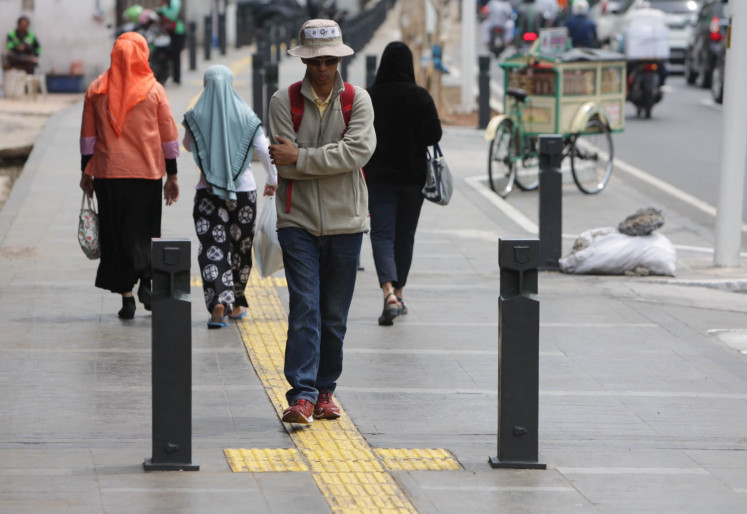Popular Reads
Top Results
Can't find what you're looking for?
View all search resultsPopular Reads
Top Results
Can't find what you're looking for?
View all search resultsWalking: More than just burning calories
Who says that walking is healthy? The answer to this seemingly simple question can vary, depending on individual attitudes and perception.
Change text size
Gift Premium Articles
to Anyone
Who says that walking is healthy?
The answer to this seemingly simple question can vary, depending on individual attitudes and perception.
“It is hot and polluted. Jakarta is not pedestrian-friendly city,” says 36-year-old Kartono (not his real name), pointing to the poor state of most sidewalks in the densely populated metropolis.
Sidewalks in many parts of the city are not only critically narrow, but also ragged and uneven, with street vendors usually occupying the public space. Pedestrians also have to compete with motorcyclists that drive on sidewalks as a traffic “shortcut” during rush hours, causing both discomfort and danger to travelers on foot.
Solitary stroller: A man walks alone on a sidewalk in Cikini, also in Central Jakarta. (JP/Wendra Ajistyatama)“I usually walk only when I am compelled to do so, and I most frequently take ride-hailing ojek (motorcycle taxi) to reach a nearby bus station or an MRT station,” says Kartono.
He is not alone. The poor condition of the city’s sidewalks can be part of the reason why many are reluctant to go on foot. Many prefer to use ride-hailing services like GoJek and Grab to reach a nearby destination.
However, for walking enthusiasts Audy Zandri and Reza Anwar, stretching their legs is a habit, irrespective of poorly maintained sidewalks.
Although they do suggest developing the city’s sidewalks to make them more pedestrian friendly, such as by using better-quality surfacing, they try to walk as much as they try to stay in shape. Walking also has other benefits, such as helping them overcome indolence.
“I have established a habit of taking a stroll since I returned to Indonesia from studying overseas. I walk once a week, covering a distance of two kilometers,” the 40-year-old told The Jakarta Post over the phone.
Audy has continued his walking habit in his Central Java hometown of Salatiga, where he now lives because of the COVID-19 epidemic.
He acknowledges that his experience of studying overseas has played an essential part in nurturing his love of walking.
Audy was enrolled from 2016 to 2018 in the Doc Nomads European Master Course, a joint degree in documentary filmmaking offered by Lusófona University in Lisbon, Portugal, the University of Theatre and Film Arts (SZFE) in Budapest, Hungary and the LUCA School of Art in Brussels, Belgium.
“I went to campus on foot, covering an average of six kilometers per day,” he recalls.
In the beginning, he traveled to the campus by tram, which was comfortable. “It cost me between 40 and 70 euros (about Rp 1.2 million) for a monthly tram ticket. On learning that the campus could be reached on foot, I then started the habit of walking. Although at the beginning, it was hard for me to do so,” he says.
“After one year [of walking to campus], I lost a significant amount of weight, from the nearly 80 kilograms before to about 60 kilograms. And I felt very healthy and fit,” he adds, recalling the positive benefits walking has had on his health until today.
During his studies in Europe, Audy also realized his dream of taking the French Way, the most popular pilgrimage route of the Ways of St. James that starts at Saint Jean Pied-de-Port in France and ends in Santiago de Compostela in Spain.
“I made the pilgrimage on my own upon completing my studies. It covered a total of 790 kilometers and it took about 30 days to complete,” he says proudly. “It made me lose weight to 57 kilograms from around 60 kilograms before,” he says.
The pilgrimage also allowed him to meet people from different nations and exchange their views on many subjects in cordial discussions. “It was really an exciting and enjoyable experience,” he says.
Audy learned a lot from his intensive experience in walking long-distance: “Walking is not merely about the health. It is a life-changing experience. Walking doesn’t change your life, but how you see life.”
Health benefits of walking
Similarly, Reza discovered the value of walking when he enrolled in the electrical engineering graduate program at the University of Arizona in the United States. It is a habit he has maintained since 1987 until today.
“My campus was about a kilometer from my apartment, and I walked an average two kilometers a day,” he told the Post.
“In the US, especially in Arizona, I noticed that most people either go on foot or ride a bicycle to cover distances of less than 10 kilometers,” says Reza, who is now an IT entrepreneur in his 50s who likes both walking and cycling.
“Walking in the US provided me with a room to ponder many things, including transcendental issues like the existence of God,” he says.
He says that walking does not necessarily have to be done outdoors. Reza started a 30-minute walking regime at home this May because of the coronavirus outbreak.
“I walk at home for about two miles, or three kilometers. If I walk outdoors, I usually cover four kilometers, or about an hour,” says Reza.
“Walking regularly makes me feel fit. Otherwise, I easily feel sleepy.”
How can walking benefit our health?
Health expert Marius Widjajarta, who chairs the Indonesian Consumer Health Protection Foundation (YPKKI), says that the short-term health benefits of walking are not immediately apparent, but diseases accumulate as we age.
“To put it simply, consumed carbohydrates should be burned [and turned] into energy, and the absence of activity will lead to carbohydrates accumulating [in the body], which could lead to potential health complications,” he said as quoted by VICE Indonesia.
Marius says that people should walk a minimum of 30 minutes per day, irrespective of age or gender.
“Walking is a cheap and simple exercise. It moves all parts of the body. So there is no reason not to walk,” he stresses.
In “Science Behind Why Going For a Walk Helps With Creativity” on Interesting Engineering (www.interestingengineering.com), Mario L. Major cites the conclusion of a 2014 Stanford University research: “While being outdoors has many cognitive benefits, walking appears to have a very specific benefit of improving creativity.”
Walking is undoubtedly good for our physical and mental health, but it also has experiential and spiritual benefits as a life-enriching recreational activity, just like Audy, Reza and likely many others have discovered. So, fancy a walk?











